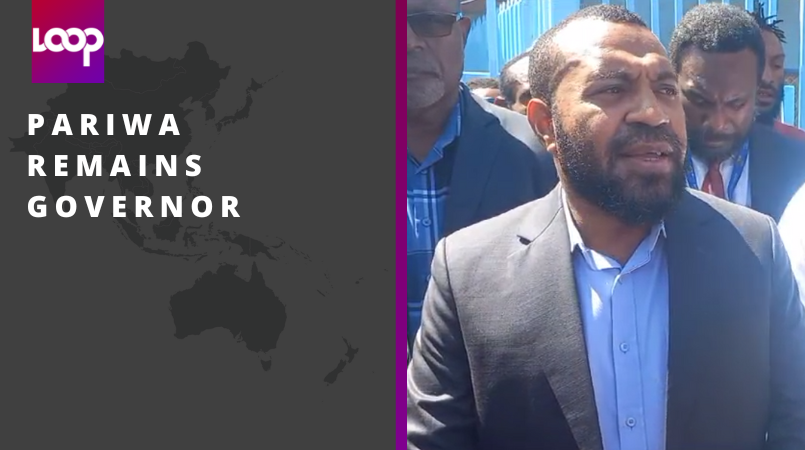
An elated Madang Governor, Ramsey Pariwa walked out of the National Court house in Madang after his case with former Brigadier General Jerry Singirok was dismissed by Justice Cannings.
He is adamant now about delivering services to his people with no more distractions from Court cases or Election Petitions.
In the matter of a disputed return for the Madang Provincial Electorate, former Brigadier General Jerry Singirok had summoned Ramsey Pariwa (first respondent) and the Electoral Commission (Second respondent) in the National Court of Justice, Election Petition No. 93 of 2022.
Mr. Singirok challenged the return of Ramsey Pariwa as a successful candidate on the ground of errors or omissions by officers of the Electoral Commission during counting and Scrutiny, relying on s 218(1) (immaterial errors not to vitiate election) of the Organic Law on National and Local Level Government Elections.
Singirok claimed three categories of errors or omissions occurred during the counting and scrutiny:
- Scrutiny of ballot papers took place without the physical presence of scrutineers for two days and during that period 4, 004 invalid votes for Mr. Pariwa were added to his tally and resulted in him being declared the successful candidate based on a false absolute majority figure
- In the two days of unlawful scrutiny, the number of live votes and informal votes changed substantially and the returning officer unlawfully refused a request for a recount of the number of informal votes
- During the whole period of the scrutiny, the counting of primary votes was done at district counting centres without the form 66A tally sheets being provided to scrutineers and this resulted in the elimination process being conducted contrary to the Organic Law.
Petitioner Singirok claimed that each category of errors and omissions affected the result of the election and the election should be declared void.
After much deliberation and assessment of evidence portrayed during the trial, Justice Cannings has dismissed the petition, following orders that Mr. Singirok will pay the costs of Mr. Pariwa, who has not been proven to be at fault in any way.
According to Justice Cannings, Singirok has proven an error on the part of officers of the Electoral Commission in the counting of the number of informal votes. Those votes were counted without any scrutiny at the provincial counting centre. The Electoral Commission relied entirely on figures provided by the returning officers at the six district counting centres. There was at no stage any checking of the figures. The quality check, which concluded on Friday 12 August 2022, did not include the informal votes.
It was a significant error. It was a breach of s 154 of the Organic Law. The error was magnified by the refusal by the returning officer and the assistant returning officer to comply with repeated requests from scrutineers
This includes the petitioner’s chief scrutineer subjecting the informal votes to a quality check and the unexplained increase of 1,763 in the number of informal votes upon the resumption of counting on the afternoon of Sunday 13 August 2022. It was this error which resulted in ground 2(2) of the petition being partly sustained.
It was not enough for the petitioner to prove that such an error occurred. The petition is based on s 218(1) of the Organic Law and he must prove that the error affected the result of the election.
It is in evidence that the Court declared Pariwa the successful candidate after securing 109, 888 votes. The Singirok was runner-up with 65, 128 votes. The winning margin was 44, 760 votes. The total number of informal votes, potentially affected by the error, was 28, 734. It cannot reasonably be inferred that the error that occurred in counting the informal votes affected the result of the election.
Judge Cannings therefore ruled that there was no good reason for the election to be declared void or for any alternative relief, such as a recount of ballot papers, to be granted.
However, the Electoral Commission has been proven to have committed errors in the counting, which led to one of the grounds of the petition being partly sustained.
Justice Cannings ordered that the Electoral Commission must be held responsible for the extensive delay in the counting, scrutiny and return of the writs, as there was confusion caused by the decision to count primary votes at the district counting centres.
Furthermore, there was poor communication with the scrutineers and this gave rise to the appearance of a lack of transparency in the counting and scrutiny at the provincial counting centre.
Justice Cannings has recommended that the Commission should conduct its internal inquiry into the causes of the delay and lack of communication that occurred so that the same mistakes are not repeated in the next election for the Madang Provincial seat.
